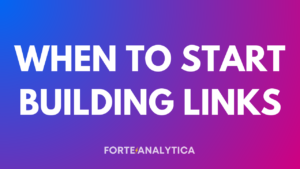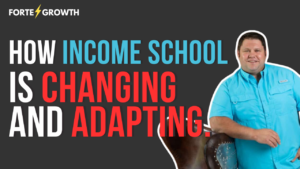In today’s competitive digital landscape, search engine optimization (SEO) has become an essential aspect of every successful online marketing strategy whether you are a small or multinational business.
One of the key components of SEO is link building, which plays a vital role in improving a website’s visibility and search engine rankings.
In this comprehensive guide, we will explore in detail what link building in SEO is, why it matters, and various strategies and techniques for effective link building that we use on our own portfolio and clients’ websites.
How does link building help SEO?
While navigating the web, you may have come across underlined or differently colored text that, when clicked, takes you to another webpage. These are called links, and they form the backbone of the internet.
Links are connections between web pages that allow users to navigate between different websites or pages. In the context of SEO, link building refers to the process of acquiring hyperlinks from other websites to your own.
Search engines view links as a vote of confidence from one website to another. When a website links to another, it signals to search engines that the linked-to website is trustworthy and relevant.
Journalists tend to use links as a way to cite a source or refer to where they used a quote from. It’s one of the main reasons why links earned from news outlets are so highly sought after.
This, in turn, influences search engine algorithms to rank the linked-to website higher in search results. Therefore, link building is crucial for improving a website’s organic search visibility and attracting more targeted traffic.
Why link building is important for SEO
Implementing effective link building strategies can yield numerous benefits for your website and online business:
- Increased organic search visibility and ranking: By acquiring high-quality backlinks from authoritative websites, you can improve your website’s visibility in search engine results pages (SERPs) and increase organic traffic.
- Targeted traffic: When you earn backlinks from relevant and authoritative websites, they serve as referral pathways, directing users who are interested in your industry or niche to your website.
- Credibility and authority building: Building a network of quality backlinks helps establish your website as a credible and authoritative source in your industry, enhancing your brand’s reputation and trustworthiness.
- Brand exposure and awareness: Link building can expose your brand to a wider audience, increasing brand visibility and awareness among potential customers.
- Enhanced user experience and website usability: Internal links and well-structured navigation contribute to a better user experience by helping visitors find relevant information easily. Additionally, they assist search engines in crawling and indexing your site effectively.
Link building strategies
There are various strategies you can employ to build links for your website:
Building high-quality backlinks
To enhance your website’s authority and search engine rankings, focus on obtaining backlinks from high-authority websites.
It is widely regarded that seed websites such as Wikipedia, Washington Post, Financial Times, etc, are some of the websites Google begins it crawl around the website. The closer you are linked to these highly authoritative sites in the link graph, the more chances Google will rate your site as a credible source.
You can achieve this through outreach campaigns, reactive or proactive PR campaigns, influencer partnerships, or content promotion.
Here is an example of an authoritative link we earned from implementing our own HARO link building service:

Guest posting, link inserts, and content marketing
By writing and publishing guest blog posts on relevant websites, you can earn valuable backlinks while also establishing your brand as an industry leader.
Another alternative that works well alongside guest posting is link inserts. You find an already article that is related to your niche, ideally gets organic traffic, and will allow you to insert a link back to your website contextually.
Content marketing involves creating high-quality and shareable content that naturally attracts backlinks which is very similar to link bait articles.
We offer a done-for-you link building service for guest posts and link inserts.
Broken link building
This technique involves finding broken links on relevant websites and offering the website owner a replacement link to your own content.
It is a win-win strategy since it helps website owners fix broken links while acquiring valuable backlinks for your website.

This tactic is deadbeat boring and very low return on time invested. You need to use a tool like Ahrefs broken backlink checker, then cold outreach these websites and find an angle to make it look appealing for them to use your website as the replacement source.
If you execute your cold outreach badly, it can simply result in the website owner or journalist simply removing the broken link and never replying to your email!
Linking internally on your website
Internal linking involves connecting different pages within your website and actively helps Google crawl throughout your website.
Using the right target anchors is vital in order to make internal linking worthwhile. Don’t link to a page unless it makes sense to do so, otherwise an actual user won’t find it helpful let alone Google.
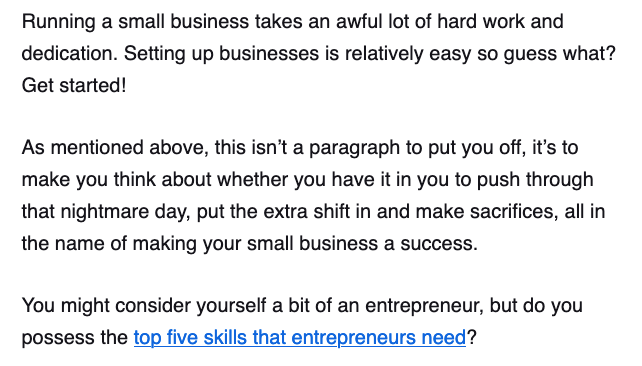
An effective internal linking strategy helps search engines understand the structure and hierarchy of your website, while also facilitating navigation for users.
You can either hire a freelancer to do this tedious task or if you are running your site on WordPress, Spencer Haw’s plugin Link Whisper will make this extremely easy and fast!
There are tonnes of SEOs with guides on internal links and the power they possess, but here are the main things you want to think about before linking internally:
- Relevancy of the link: Is it relevant from one page to another?
- Choose the correct keyword anchor: Using a partial keyword match, exact match, or naked. Generally, mixing your internal link anchors is common practice.
- Contextual relevance: Does the internal link make sense with the content that surrounds it?
- Underrated bonus pointer: Keep a running average consistent throughout your site on internal links. Cyrus Shepherd mentioned most sites benefit the most from having a maximum of 10-12 contextual internal links.
Earning natural links through valuable content
Creating content that is highly valuable and shareable increases the chances of other websites linking to your content naturally.
This can be achieved by producing authoritative articles, infographics, or research studies that provide unique insights – this is a piece of jargon called link baiting.
Here is an example of an infographic we published for Finty.com that still gets links nearly 10 years on:
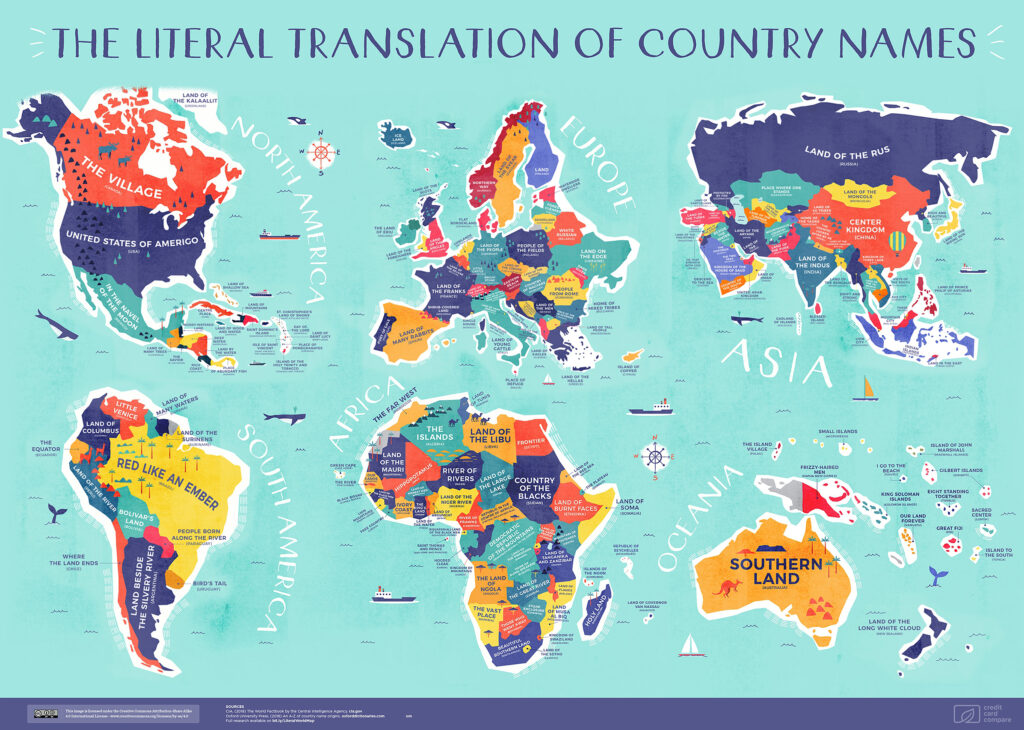
This particular infographic brought in mega links from BBC, Digg (if you remember them), Daily Mail, Note.com, Gizmodo, Lonely Planet, Mental Floss, Business Insider, and yeah, 100+ more! Here is an overview from Ahrefs:
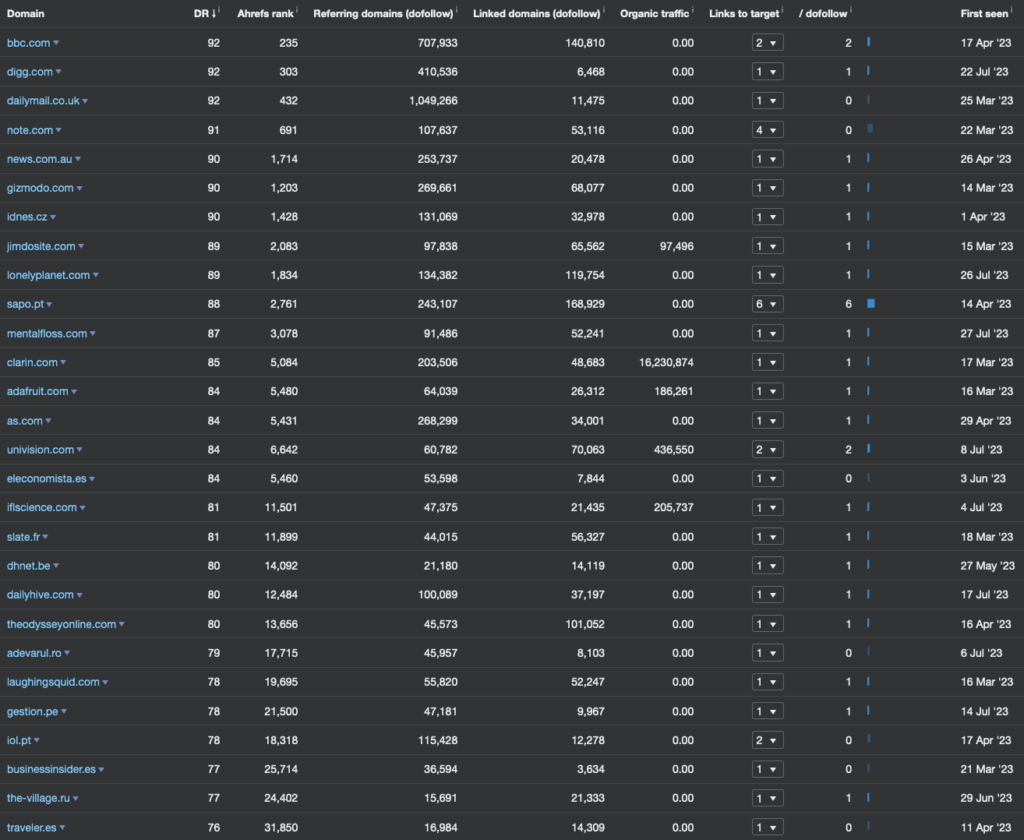
Leveraging brand mentions and unlinked brand mentions
Monitoring brand mentions on other websites, including both linked and unlinked mentions, presents an opportunity to reach out to website owners or journalists and ask for a backlink!
This strategy helps increase brand exposure and acquire valuable backlinks.
If you are a large and already established business, you may find more unlinked brand mentions throughout the web than you may think. Many bricks and mortar businesses that eventually embrace SEO can usually find tonnes of brand mentions with no backlink!
Having said that, unlinked brand mentions can be just as good as linked mentions. Some websites or publications will simply not link out due to in-house SEO guidelines.

If you have built your website’s entity, Google over time will acknowledge your brand name because of the brand name featured in homepage anchor backlinks.
For example, our website is called “Forte Analytica” and the website is www.forteanalytica.co.uk – chances are we will be naturally or proactively building links with the anchor text to the homepage with “Forte Analytica”.
Advanced link building techniques
While the basic link building strategies mentioned above are effective, advanced tactics can provide an extra boost to your link building efforts:
Competitor backlink analysis
Analyzing your competitors’ backlink profiles can reveal valuable linking opportunities.
Identify the websites linking to your competitors and try to copy or improve upon their approach to secure backlinks.
The general tactic of this technique is, if my competitor has got that backlink from that referring domain – I want it. Even better, if it’s on the same page as your competitor.
Ultimately, by completing a competitor backlink analysis you aim to achieve what is called “closing the link gap”.
Skyscraper technique
This technique involves creating better and more comprehensive content than what already exists online and reaching out to websites that have linked to similar inferior content.
By offering superior content as a replacement, you can acquire relevant and high-quality backlinks.
Building relationships and networking
Networking with influencers and others in your industry can open doors for collaboration and link building opportunities.
By building strong relationships, you improve your chances of acquiring valuable backlinks through mutual support and cooperation.
Link building tools and resources
To streamline your link building efforts, several tools and resources are available:
- Backlink Analytics Tools: Tools like SEMrush Backlink Analytics and Moz Link Explorer provide insights into your website’s backlink profile, helping you evaluate its quality and identify linking opportunities.
- Broken Link Checkers: Tools like Ahrefs Broken Link Checker or SEMrush Backlink Audit Tool start by scanning websites for broken links, enabling you to offer relevant alternatives and gain backlinks.
- Competitor Analysis Tools: Tools such as SEMrush’s Competitors Backlink Profiler help analyze your competitors’ backlink profiles and discover potential backlink sources.
- Link Building Communities and Online Forums: Joining communities and forums focused on SEO and link building, such as Reddit’s r/SEO or Google Webmaster Central Help Forum, provides access to valuable insights, recommendations, and link building opportunities.
FAQs
Is link building still relevant in SEO?
Absolutely! Link building remains an essential aspect of SEO. Google continues to rely on links as a crucial factor in determining a website’s authority, relevance, and ranking in search results. It will carry on due to the rise of AI content, how else will Google differentiate between good and bad content, other than links being used as a vote of confidence.
Are all backlinks equally beneficial for SEO?
No, not all backlinks are created equal. The quality and relevance of the linking website, the anchor text used, and the context of the link all contribute to the overall value of a backlink. High-quality backlinks from authoritative websites in your industry are more beneficial for SEO.
Can I buy backlinks to improve my website’s SEO?
Yes, however, buying backlinks goes against Google webmaster guidelines and can result in severe penalties, this is rare and only happens if you buy from link farms, PBNs, or unnatural backlinks aimed at gaming the algorithm.
How long does it take to see the results of link building efforts?
Link building is a long-term strategy, and it may take several months to see significant results. Patience, consistency, and a well-executed link building plan are key to achieving sustainable improvements in search engine rankings.
Is internal linking important for SEO?
Yes, internal linking plays a crucial role in website navigation, user experience, and search engine crawling and indexing. Strategic internal linking can help distribute authority throughout your website and improve the overall visibility of your pages in search results.
